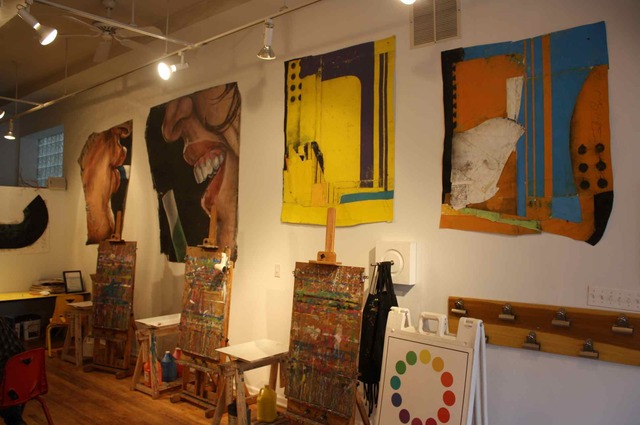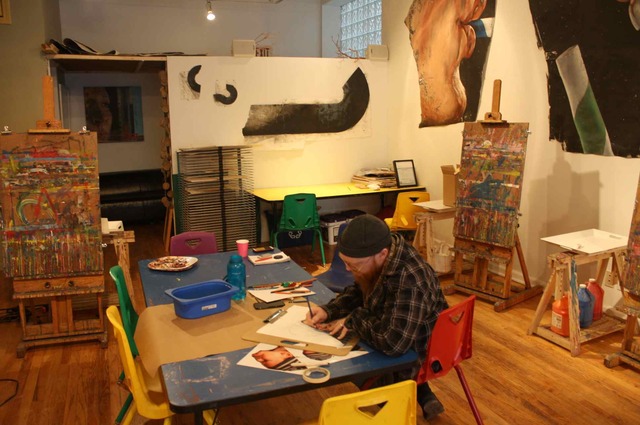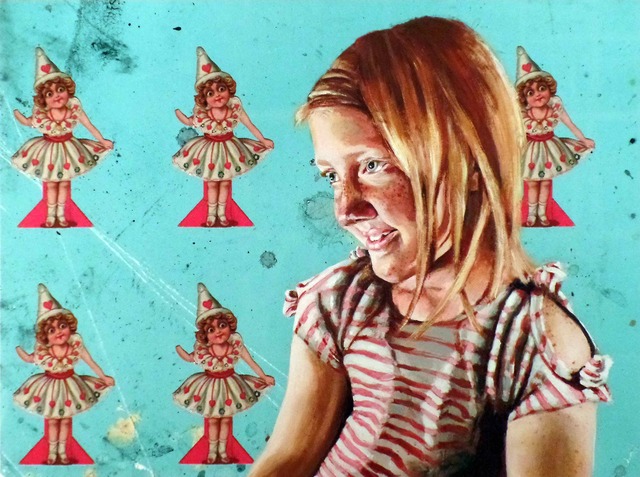On A Mission: The Tireless Passion Of Artist Donald Jackson
By Carrie McGath in Arts & Entertainment on Mar 25, 2015 8:45PM

View of The Color Wheel Studio. Photo by Carrie McGath.
Donald Jackson's life is absolutely filled with creativity fueled by his passion for psychology. His Bucktown studio is also a school for children from 2 to 12 years old to learn not only about the techniques of creating art, but about the artistic process in relation to themselves, all while giving them a vast appreciation for art and abstract thinking. Jackson has been an avid reader of the work around developmental psychology and employs this knowledge in his classes. The Color Wheel Studio is a space not only filled with the tools for students and Jackson to create, but it also houses some of the Jackson's own work as a visible lesson of an artist's process.
Jackson's passion for psychology is the impetus for this need to observe. "I don't like to interact with things. I like to watch how people interact with each other, the choices they make. I sit back and watch and take notes." He continues, "I have always been interested in what people think and why they're thinking that at that time, and I have been studying that most of my life. Developmental psychology has always been an interest of mine and that's why I work with kids. I am interested in how a work affects the viewer."
He started Color Wheel Studio five years ago because he disapproved of how art was being taught in the schools. With his knowledge of the developing brain, he knows what to teach, when to teach it and how to teach it. "I never went to school to be a teacher, but I am a teaching artist and maybe that's the difference," he says. "What I like to focus on because of my psychology background is how these kids are seeing things at 2 and 3 years old, and I am always a couple steps ahead of them so I can keep pushing them."

Donald Jackson in The Color Wheel Studio. Photo by Carrie McGath
During our visit to the studio, he was drawing a version of one of the works that was previously on view at Adventureland Gallery for his show, Young Love: A Story of Intrigue, Gossip and Apathy. Drawing is an activity he is visiting for the first time in many years. He said the drawing tools he is uses are the same ones the kids use during their classes, showing his utmost respect for the young ones working by his side in his studio. This piece, like the majority of his work, is a work on paper, a medium he says is "sexy" and more malleable. "98% of the work I do is on paper and constructed from these giant pieces of paper and I keep sanding it down as I work on it. I end up painting over it 6 or 7 times because so much gets worn away. There is so much beating I put them through, I never know how the paper will be shaped in the end. I get bored pretty easily and this keeps me on my toes."
The show at Adventureland Gallery tells a story that is deeply psychological as it muses on childhood and the development and emotion so ingrained in those years. His son and his friend are the characters in this narrative and Jackson says it is a series that is very different than the work he usually creates. "That show is very different than what I normally do. It was made for that particular space and I wanted to be able to tell a story. "That series was an approach to thinking about childhood," he says. The Dick and Jane books' color palette and the posing of the characters was a part of his thinking as well when he put the work together for the show.

'Intrigue,' 18 x 24 inches. Courtesy of Donald Jackson.
His works are predominantly large-scale and two examples of such large works hang in the studio. Two pieces quote Pepsi advertisements and have a rough, weathered and textured appearance. They look as if they were torn from a billboard and his signature that he adds to his work slithers up the side, furthering a branded appearance. "For these Pepsi ad pieces, I actually found a billboard that was pulled off a bus and it was thrown into a gutter and I tore away at it," he explains. "It had about five different layers and I kept peeling them and ripping off pieces and added them to my sketchbook." This found billboard was inspirational for these Pepsi ads, showing also his movement toward a Pop Art aesthetic.
Jackson's belief in how the environment he lives in and is always surrounded by actively informs his art. "I live in the city and it is a beautiful, disgusting mess, and that's my environment. I wouldn't be able to paint a nice landscape because I don't live in that nice, pretty landscape." His urban home of Chicago is decidedly physical, edgy and rough where advertisements and potholes are a part of just about every moment as he navigates the landscape. "My work is very physical. If I want a hole in the piece, I make a hole; I don't just paint an image of a hole." This is a telling statement since a lot of what we spoke about in his studio was a discussion about process. Beating up the paper he works on and his large signature along the side of his work is a tangible statement of this love of process. "I can't stand the shiny, glossy art that doesn't even look like the artist touched the thing; it drives me insane seeing that. I want to see fingerprints and footprints. I want to see that the artist touched these things and worked on these things, so all my work is extremely physical. So putting my name on there like that, helps me become a part of the piece, especially since it runs up the side like that, it isn't really viewed as just a signature."
Affecting a viewer goes beyond his classroom and into the homes of his clients. He said many of his clients have very intense jobs and they often tell him that coming home and looking at his work calms them. He says, "It's kind of like my little psychological help I can give without being there." His version of sketching often takes the form of writing where he puts a lot of words in his sketchbooks as well as things he finds on the street that he tapes into them. This process, he says, gives him insight into where his head is at a given time and so it is introspective and ponders his personal psychological space to a work. His sketching alludes to a free association reminiscent of so much Modernist work and his use of his environment demonstrates the subliminal residue imprinted upon us as we go about our lives.
The show at Adventureland Gallery has closed, but his work is always available for viewing at his studio, a space very open and welcoming to the public. Jackson is already an important part of the city's art scene as an artist and will continue to be a force, but perhaps the most unique and wonderful part of Donald Jackson is his keen passion for expanding the minds of his students.
The Color Wheel Studio is located at 2034 N. Damen Ave.